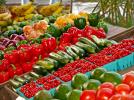Horizon Europe Project WASTEtoSAFETY: A circular economy approach to valorizing orange peel waste to establish food safety
- Type Project
- Status Signed
- Execution 2024 -2026
- Assigned Budget 165.312,96 €
- Scope Europeo
- Main source of financing Horizon Europe 2021-2027
- Project website Proyecto WASTEtoSAFETY
Food safety and food waste management are interrelated challenges that impact the economy, the environment, and public health. Europe reports 23 million cases of foodborne illness and 5,000 related deaths annually. At the same time, one-third of the food produced, approximately 1.3 billion tons, is wasted.
Supported by the Marie Skłodowska-Curie Actions (MSCA) program, the WASTEtoSAFETY project seeks to address these problems by developing a circular economy approach. It focuses on the valorization of citrus industry waste to extend the shelf life of Mediterranean fresh produce. Using microwave and ultrasound techniques, essential oils will be extracted from orange peels and used in food preservation technologies. This innovative project also assesses the impacts on the food chain, offering significant advances in food science.
Two environmentally friendly methods (microwave and ultrasound) will be optimized for the extraction of essential oils (EOs) from orange peel. The EO will be used as the basis for two food preservation technologies: a washing solution and active packaging. The project will also assess their potential impact on the food chain through a quantitative microbiological risk assessment (QMRA), a life cycle analysis (LCA), and a material flow analysis.
Food safety and food waste management remain two major challenges in Europe, with enormous impacts on the economy, the environment, and public health. Each year, 23 million cases of foodborne illness and 5,000 deaths are reported in Europe. At the same time, one-third of food produced for human consumption is wasted because it is deemed unfit for consumption, equivalent to approximately 1.3 billion tons each year.
Therefore, the development of innovative measures to reduce food waste presents a viable alternative in a situation where new solutions are desperately needed. In this regard, the development of circular economies that repurpose food industry byproducts and waste as reusable products is a promising avenue of research. WASTEtoSAFETY will address this challenge by developing the scientific foundations for implementing a circular economy that utilizes citrus industry waste to extend the shelf life of fresh produce from the Mediterranean region.
Specifically, it will optimize two "green" methods (microwaves and ultrasound) for the extraction of essential oils (EOs) from orange peel. The EO will be used as the basis for two food preservation technologies: a washing solution and active packaging. The project will also assess its potential impact on the food chain through a quantitative microbiological risk assessment (QMRA), a life cycle analysis (LCA), and a material flow analysis. WASTEtoSAFETY will thus provide tangible advances in the field of food science, developing a significant solution for the recovery and utilization of citrus fruit waste.
It will also open up new avenues of research related to scaling these technologies to an industrial level.
- UNIVERSIDAD POLITECNICA DE CARTAGENA (UPCT)







